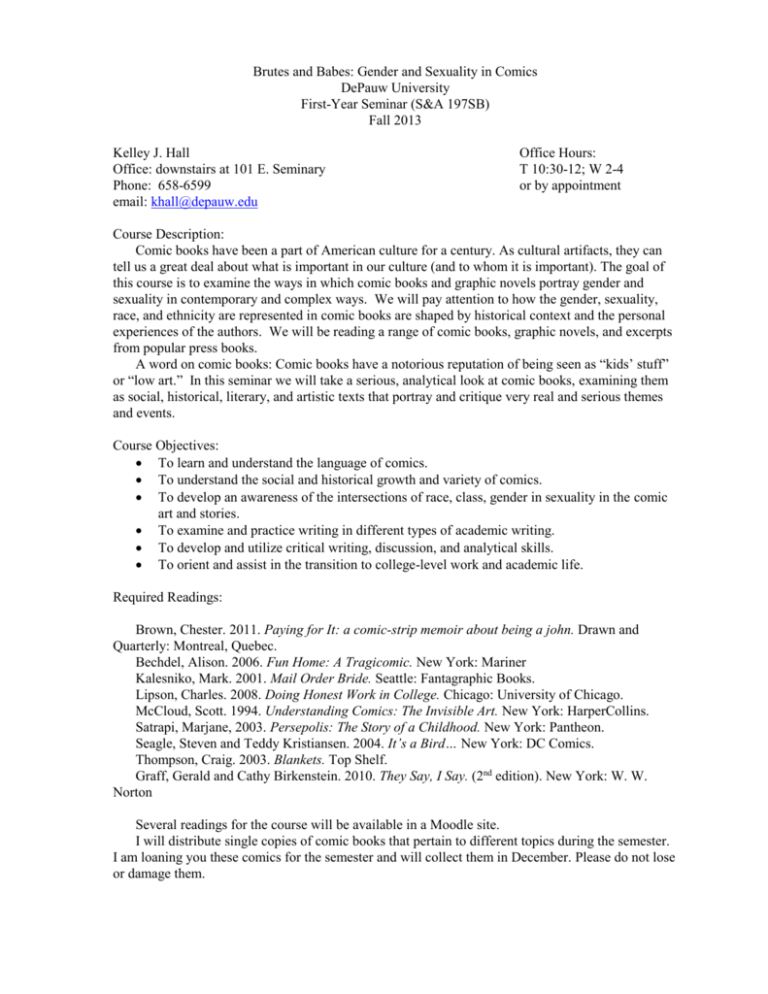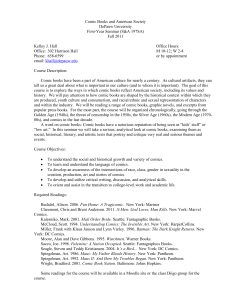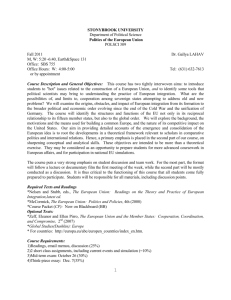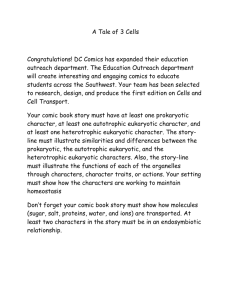Comic Books in American Society
advertisement

Brutes and Babes: Gender and Sexuality in Comics DePauw University First-Year Seminar (S&A 197SB) Fall 2013 Kelley J. Hall Office: downstairs at 101 E. Seminary Phone: 658-6599 email: khall@depauw.edu Office Hours: T 10:30-12; W 2-4 or by appointment Course Description: Comic books have been a part of American culture for a century. As cultural artifacts, they can tell us a great deal about what is important in our culture (and to whom it is important). The goal of this course is to examine the ways in which comic books and graphic novels portray gender and sexuality in contemporary and complex ways. We will pay attention to how the gender, sexuality, race, and ethnicity are represented in comic books are shaped by historical context and the personal experiences of the authors. We will be reading a range of comic books, graphic novels, and excerpts from popular press books. A word on comic books: Comic books have a notorious reputation of being seen as “kids’ stuff” or “low art.” In this seminar we will take a serious, analytical look at comic books, examining them as social, historical, literary, and artistic texts that portray and critique very real and serious themes and events. Course Objectives: To learn and understand the language of comics. To understand the social and historical growth and variety of comics. To develop an awareness of the intersections of race, class, gender in sexuality in the comic art and stories. To examine and practice writing in different types of academic writing. To develop and utilize critical writing, discussion, and analytical skills. To orient and assist in the transition to college-level work and academic life. Required Readings: Brown, Chester. 2011. Paying for It: a comic-strip memoir about being a john. Drawn and Quarterly: Montreal, Quebec. Bechdel, Alison. 2006. Fun Home: A Tragicomic. New York: Mariner Kalesniko, Mark. 2001. Mail Order Bride. Seattle: Fantagraphic Books. Lipson, Charles. 2008. Doing Honest Work in College. Chicago: University of Chicago. McCloud, Scott. 1994. Understanding Comics: The Invisible Art. New York: HarperCollins. Satrapi, Marjane, 2003. Persepolis: The Story of a Childhood. New York: Pantheon. Seagle, Steven and Teddy Kristiansen. 2004. It’s a Bird… New York: DC Comics. Thompson, Craig. 2003. Blankets. Top Shelf. Graff, Gerald and Cathy Birkenstein. 2010. They Say, I Say. (2nd edition). New York: W. W. Norton Several readings for the course will be available in a Moodle site. I will distribute single copies of comic books that pertain to different topics during the semester. I am loaning you these comics for the semester and will collect them in December. Please do not lose or damage them. Course Requirements: 1. Daily Preparation, Attendance, and Participation (30 points): Class participation, which means active and thoughtful involvement in the class discussions and activities, is an important part of your grade. A seminar is a learning environment in which the priority is the discussion of course materials. While I will give some lecture during the semester, I see my primary role as the facilitator of class discussion. As members of a small seminar, the success of the class on any given day depends on the preparation of all members. Writing up your thoughts about the readings contributes to this process because you enter into the discussion with a clear idea of questions and comments. Therefore, you should be prepared to comment, critique, or raise questions about the readings. Clearly your attendance is essential for this portion of your grade. Like every first-year seminar, this course is the first tier of the writing curriculum at DePauw University. We will be deliberate in our attention to, and practice of, writing. To that end, we will spend time in and out of class discussing, revising, sharing, and strengthening your writing skills to prepare you for college-level expectations. Attentive and constructive participation in these activities constitutes part of your participation grade. 2. Friday Memos (8 points each): You are required to write six memos discussing the week’s readings during the semester (2-3 typed pages each). Each week’s memo must be emailed to me (khall@depauw.edu) before noon on Friday; I will not accept late memos. You must complete at least one memo on or before September 13 and two more before Fall Break—I will not accept more than three memos after that point of the semester. We will schedule a paper conference to discuss your first memo. In contrast to writing assignments with specific due dates listed in the course schedule (which may include peer editing or class discussion), these memos will be read only by me. Memos need not be summaries of the week’s readings. In fact, memos that include reactions to specific arguments, comparisons between authors/creators, or applications/connections to previous readings or everyday life outside this course will earn better scores. In short, be critical and insightful about what you discuss in your memos. When appropriate, use and cite course readings correctly. Be creative. Don’t regurgitate. 3. Essays (30 points each, plus presentation 10 points): During the semester we will write three formal essays. The first essay will address the “why the world doesn’t need Superman.” The second essay will examine the themes of childhood/adolescence or identity development through graphic novels and social science research. For the third essay, we will investigate different perspectives on prostitution and sex work. Students will be assigned a perspective on this topic and critique Chester Brown’s arguments for prostitution in Paying for It. Instructions for these assignments will be distributed in class. 4. Midterm Take-Home Exam (30 points): There will be a take-home midterm exam that covers significant concepts and ideas from the first half of the semester. 5. Final Project (50 points): You will be required to complete a final project related to the course content. The format and topic of the final project will be fairly open and creative, ranging from a standard research paper to the detailed conceptualization of your own comic book. Instructions for this assignment will be handed out in class. Add it up Daily Participation and Preparation 30 points Friday Memos (6 x 8 points each) 48 points Why the World Doesn’t Need Superman 30 points Childhood and Adolescence Essay 30 points Prostitution/Sex Work Essay 40 points Midterm Take-Home Exam 30 points Final Project 50 points Total: 258 points Grading Scale: 94-100% = A 90-93 = A87-89 = B+ 84-86 = B 80-83 77-79 74-76 70-73 = B= C+ =C = C- 67-69 = D+ 64-66 = D 60-63 = D0-59 = F Grading Criteria: These criteria apply to all writing assignments and correspond to the percentages above. A- to A: means that the piece successfully captured the main points of the readings and that they were connected to the assignment. The paper illustrates clear and relevant insights and understanding and shows that the writer thought carefully about what he or she was going to write. The paper is exceptionally thought-provoking, original, and lucid in content and organization. The paper has something to say, and says it clearly and gracefully to an appropriate audience; it is supported fully by sources and appropriate examples. This grade also indicates exceptional writing skills in terms of clarity, grammar, and punctuation. B- to B+: means that the piece accurately captured the main points of the readings and that they were connected to the assignment. The paper illustrates that the writer thought about the readings (and what they meant) and that he or she made an attempt to connect it to course concepts and issues. The paper is solid and well-organized but not striking; the writer has a definite point to make and makes it in an organized and competent way. This grade also demonstrates good writing skills in terms of clarity, grammar, and punctuation. C- to C+: means that the piece did not quite capture the main points of the readings accurately and/or didn’t attend carefully to the requirements of the assignment. It seems from the piece that the writer did not understand the readings and/or think carefully about linking it to course concepts and issues. The content and organization is weak, fuzzy, or illogical. Examples are given for their own sake or to demonstrate that the writer read the text, not to make a point. This grade may also indicate writing problems in terms of clarity, grammar, and punctuation. D- to D+: means that the paper shows blatant inaccuracies regarding the readings, the writer did not complete part of the assignment, and/or that writing problems impede my ability to understand the piece. The paper is much shorter than the assigned length and appears as though there isn’t a point to the paper. This grade may also indicate serious writing problems in terms of clarity, grammar, and punctuation. F: means that the paper is plagiarized in part or as a whole (see Academic Integrity Policy below), or it shows general weaknesses ever graver than those of a D paper. Course Policies: Consistent tardiness and unexcused absences will negatively affect your final grade. Excused absences must be discussed with me in advance, and that does not guarantee your absence will be excused. All writing assignments must be sent/turned in on their announced due dates. Without a reasonable excuse discussed with me in advance, failure to turn in assignments on time will result in a three-point reduction in the score per class day late. I will not accept late overnight, take-home assignments. You are responsible for material discussed and/or assigned when you are absent. If you are absent, contact a classmate to double check reading or homework assignments. We will use laptop computers almost daily for in-class discussions and activities. Please bring it to class. If there is no obvious reason for you to be using your laptop, resist the temptation: keep it closed. I can tell when students are reading email or Facebooking. I will call you out. DePauw University is committed to providing equal access to academic programs and University administered activities and reasonable accommodations to students with disabilities, in compliance with the Americans With Disabilities Act and Amendments (ADAAA). If you feel you need an accommodation based on the impact of a disability or learning challenge you are strongly encouraged to contact Pamela Roberts, Coordinator of Academic Success and Student Disability Services, for further information on how to receive accommodations and support. Academic Success and Student Disability Services is located downstairs in 101 E. Seminary St., 765-658-6267. Academic Integrity: I will not tolerate academic dishonesty (and you shouldn’t either). Cheating, plagiarism, presenting another person’s work as your own, etc. violates DePauw University’s policy on academic integrity and will result in penalties ranging from a zero on the assignment to course failure or expulsion. Presenting your own work as something new (i.e., “recycling” a paper from another course) is also unacceptable. See the policy and discussion of students’ obligations and rights in the Student Handbook. Be sure to follow guidelines for proper citation of sources in your writing. If you are unsure what constitutes plagiarism, representing another’s work as your own, “recycling,” etc., see me. Course Schedule (tentative) Aug. 29 Introductions and Course Overview Free write: comic book autobiography Sept. 3 Understanding Comics McCloud: Introduction, Chap. 1, They Say/I Say, Intro, Chaps. 1, Entering the Conversation, and 11, Discussion Lipson, Chaps. 1-2 Sept. 5/10 McCloud Chap 2 They Say/I Say, Chap. 2, The Art of Summarizing Prepare a summary of McCloud chapter, the diagram on p. 52-53 in particular. Sept. 12 McCloud Chaps. 3-4 Kalesniko, Mail Order Bride, pp. 1-50 Sept. 17 McCloud Chaps. 5-6 Kalesniko, pp. 51-146 Sept. 19 McCloud Chaps. 7-end They Say/I Say, Chap. 3, The Art of Quoting Kalesniko, pp. 148-end James Kakalios "Physics of Superheroes." 7:30-9pm Watson Forum (Recommended) (Suggested reading: Lipson, Chap. 3 “Taking Good Notes”) Sept. 23 Super- Kristy Guevara-Flanagan “Wonder Woman: The Untold Story of American heroines” Screening and Q&A 7-10pm Watson Forum (Required) Sept. 24 Seagle and Kristiansen. It’s a Bird… They Say/I Say, Chap. 4, Three Ways to Respond (Focus on the vignettes about Superman) Sept. 26 Seagle and Kristiansen. It’s a Bird… They Say/I Say, Chap. 5 and Chap. 10, The Art of Metacommentary (Focus on the Steven Seagle’s story) Oct. 1 Why the World Doesn’t Need Superman Essay In-Class Peer Editing They Say/I Say, Chap. 6 and 7, Planting a Skeptic and Saying Why it Matters Bring two hard copies of your essay to class. Oct. 3/8 They Say/I Say, Chap. 13, Writing in the Sciences Biological Conservation article. (Distributed in class) Why the World Doesn’t Need Superman Due (Oct. 3) Oct. 10 Library Research Session Lipson, Chap. 3 Take-home Midterm Due Oct. 15/17 Satrapi, Persepolis They Say/I Say, Chap. 14, Writing in the Social Sciences Merten. “The Meaning of Meanness: Popularity, Competition, and Conflict among Junior High School Girls.”(Moodle) Oct. 22/24 Fall Break Oct. 29/31 Thompson, Blankets They Say/I Say, Chaps. 8-9 Nov. 1 Last day to withdraw from a class with grade of W. Nov. 5/7/12 Gardiner. “Queering Genre: Alison Bechdel’s Fun Home.” (Moodle) Bechdel, Fun Home Nov. 14/19 Creating Comics Workshop: Troy Cummings Adolescent Identities in Comics Essay Due (Nov. 14) Nov. 21/26 Readings from multiple perspectives on prostitution and sex work (Moodle) Nov. 28 No class. Thanksgiving Dec. 3/5/10 Prostitution and Sex Work Brown, Paying for It In-Class Group Presentations (Dec. 10) Dec. 12 Wrap up and Conclusions Position Paper Due Dec. 19 Final Project Due 4pm








